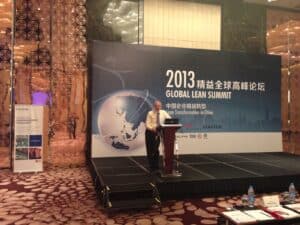
From July 3rd to July 5th 2013 the Global Lean Summit, China’s most relevant and popular lean event, took place in Shanghai and was attended by over 200 guests. The event was characterised by interesting speeches, enriching exchange and the promotion of learning opportunities. Its slogan “Lean Transformation in China” set out the theme of the summit, which focussed on the experiences made and challenges encountered on the lean journey of many Chinese companies. Keynote speaker was Professor Dr. Jeffrey K. Liker, who is a cooperation partner of Staufen, international lean expert and author of “The Toyota Way”. He invited the participants to join discussions and discover culture-specific key success factors of long-lasting lean transformation success. Mr. Ritsuo Shingo, President of the Institute of Management Improvement and son of the famous Shigeo Shingo, as well as many other speakers with a broad range of industry and consulting experience shared their knowledge with the audience during speeches and round table discussions. On the pre-summit day two introductory workshops were offered: “Lean Leadership” held by Dr. Jeffrey Liker and “Shop Floor Management” by Rainer Voelker. Mr. Voelker, International Senior Consultant at Staufen Shanghai, presented key points of successful management at the “Gemba” (Shop Floor). His workshop also provided illustrative examples and a simulation with emphasis on practical learning and encouragement of discussion. Dr. Marcus Chao, CEO and President of Lean Enterprise China, officially opened the first summit day followed by Dr. Liker’s first speech. In his afternoon presentation Liker focussed on lean culture and pointed out that China’s business environment “should support long-term cultural development” since long-term thinking plays a much more important role in Chinese mentality than in those of other industrialised nations. Furthermore, he pointed out that cultural change cannot be achieved in a few years, but needs decades of strong and continuous effort. To bring about a fundamental change of culture the underlying attitudes and values need to be altered. He concluded by pointing out that an effective and guided change can only be achieved through a transformation of daily behaviour: “It’s easier to act your way to a new way of thinking than to think your way to a new way of acting”. The following presentation by Dr. Neo, Plant Manager of Energizer (China) Co. Ltd., demonstrated the two pillars upon which a lean journey’s success is built and what kind of culture is required: “It takes two hands to clap. One is ‘respect for people’, the other ‘continuous improvement’.” Besides strong attention to these cornerstones of success in lean transformation he recommended visiting benchmark companies and learning from them. Interested people who intend to follow Mr. Neo’s advice are invited to join Staufen’s BestPractice visits or the Staufen BestPractice Tour to gain insights in the operation processes of benchmark companies. The first summit day ended with a round table discussion moderated by Markus Franz, Director Academy of Staufen Group, who invited the audience to address questions to the speakers of the day. On the second day several more speeches were accompanied by three different learning sessions about lean application in manufacturing industries, lean in administration processes and A3 problem solving, which was conducted by David Cao, Senior Consultant at Staufen. In the afternoon Tony Tan welcomed the audience to a talk about the big role capability building plays for lean enterprises and how good leaders can effectively train good employees. The Global Lean Summit 2013 was hosted by the Lean Enterprise Institute China in collaboration with DuPont and Staufen Shanghai Consulting Academy Ltd.

